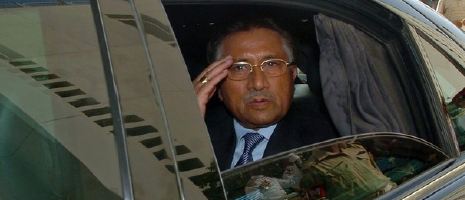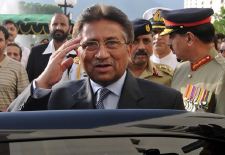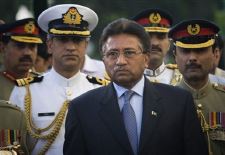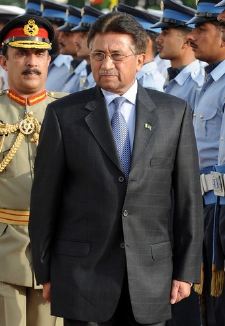Adil Najam
In a nationally televised speech, Gen. Pervez Musharraf, President of Pakistan, has just announced his resignation, pre-empting a move to impeach him by the parliament.
This post has been updated to add news photos from this momentous day in Pakistan’s political history. The pictures speak eloquently of the moods and thoughts of the day. (Scroll down to see the video of Gen. Musharraf’s resignation speech).
Participate in a poll on what might be Pakistan’s future post-Musharraf, here.
![]()
Here is a Pervez Musharraf time-line, published in The News:
August 1943: Born in Delhi, India
1964: Joins Pakistani army.
1998: Becomes army chief of staff.
October 1999: Seizes power in a bloodless military coup, overthrowing the prime minister, Nawaz Sharif. In response, the Commonwealth suspends Pakistan’s membership.
June 20 2001: Makes himself president, replacing Rafiq Tarar, while remaining head of the army. Tarar is forced out of office when the parliament that elected him is dissolved.
July 2001: Holds first meeting with the Indian prime minister, Atal Bihari Vajpayee, at Agra in India. No progress is made because of differences over the disputed territory of Kashmir.
September 2001: George Bush courts Musharraf, asking him to join him in his “war on terror” and help defeat the Taliban in neighbouring Afghanistan. The US president promises Pakistan $1bn in aid.
April 2002: Wins a referendum giving him another five years in office. Observers criticise the referendum as blighted by irregularities.
May 2002: Pakistan test fires three medium-range surface-to-surface missiles capable of carrying nuclear warheads. Musharraf insists his country would not be the one to initiate war.
August 2002: Consolidates his power still further, giving himself the right to dismiss an elected parliament.
October 2002: Pakistan’s first general election since Musharraf seized power in 1999 results in a hung parliament.
November 2002: Mir Zafarullah Jamali becomes the first civilian prime minister since 1999. He is a member of a Musharraf-supporting party.
November 2003: Pakistan’s National Assembly meets for the first time since 1999.
December 2003: Musharraf promises to step down as head of the army by January 2005.
May 2004: Pakistan is readmitted to the Commonwealth.
December 2004: Musharraf announces he will stay on as head of the army.
August 2005: Pakistan tests its first nuclear-capable cruise missile.
March 2007: Musharraf suspends the chief justice, Iftakar Mohammed Chaudhry, triggering a wave of anger across the country and the first joint protests held by the parties of exiled former prime ministers Benazir Bhutto and Nawaz Sharif.
October 2007: Signs a corruption amnesty, opening the way for Bhutto’s return and a possible power-sharing agreement. Within hours of Bhutto’s arrival back in the country, bombers attack a Bhutto rally in Karachi, killing more than 100 people.
November 2007: Declares a state of emergency, rounding up opposition leaders at gunpoint. In the same month, Musharraf quits as head of the army, becoming a civilian president.
December 15 2007: Lifts state of emergency and announces plans to go ahead with parliamentary elections scheduled for January 8.
December 27 2007: Benazir Bhutto is assassinated at an election rally in Rawalpindi.
January 2008: Elections postponed until February 18.
February 2008: The two main opposition parties gain a clear majority in the elections.
August 2008: The two main parties strike a deal to impeach Musharraf if parliament backs the move.
August 18 2008: Musharraf announces his resignation

























































Response to Ms Kiran’s comment:
Let us assume whatever you said is correct, does it mean to kill all those inocents young students with bombs and guns? what is the difference between government and them now? government acted in the another form of extremism, hope people understand.
I don
@ Post-Musharraf Gold rush, now Zarbhutt’s are surely
up to another fraud.
Adding to the exhaustive list of Steve
May 2006: TORONTO (CP) — Barrick Gold Corp. [TSX:ABX; NYSE:ABX], the world’s biggest gold producer, says it’s open to further expansion in Pakistan – which it considers more politically stable than some countries in South America.
”Pakistan … from a mining point of view, from a business point of view, is among the better countries (to invest in),” founder and chairman Peter Munk told shareholders during the Canadian company’s annual meeting Thursday.
…
Barrick bought a stake in the Reko Dig copper-gold project in Pakistan for $100 million in February from Antofagasta PLC, a Chilean mining group.
When CEO Greg Wilkins went to Pakistan in connection with that project, Munk said, he was received by both Prime Minister Shaukat Aziz and President Pervez Musharraf.
”If a country has time to have its president – who’s in the middle of a, politically, highly charged region, courted by Soviets, China, Muslims and America – has time to sit down … with Greg to encourage him to invest money and invite a Canadian company to come in to develop the country’s resources, it shows you what a great country it is.”
http://www.resourceinvestor.com/pebble.asp?relid=1 9454
Getting rid of Musharraf won’t do anything. I have a bad feeling that it will only make things worse. The next president will be a chamcha of Mr 10%.
We need some serious reforms in this country to allow real democracy to take root. And the first of these reforms should be to get rid of the feudal system. This needs to be our next priority.